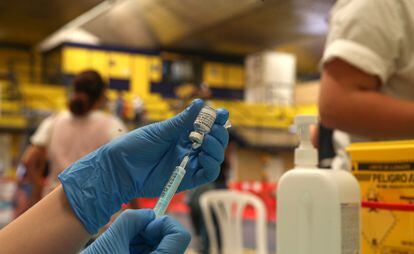Most under-60s with first AstraZeneca shot choosing to repeat vaccine for second dose
The majority of Spanish essential workers in this age group are opting for the Anglo-Swedish medication over Pfizer, despite its links to rare cases of blood clots
/cloudfront-eu-central-1.images.arcpublishing.com/prisa/DUTSXSDIQVZOQJBVVO67JMPFTA.jpg)
The Spanish Health Ministry’s plan of offering essential workers under the age of 60 a choice when it comes to their second Covid-19 vaccine dose is not working out as expected.
This group was given AstraZeneca for their first shot several months ago now, but the process was put on hold after links were established between the medication and rare cases of blood clots. After a study was conducted by the Carlos III Health Institute in Madrid, the ministry and the regions agreed to offer people a second dose of the Pfizer-BioNTech vaccine – or the AstraZeneca if they preferred and were willing to sign an informed consent form.
But the first people who have gone for their second shot are mostly following the advice of the European Medicines Agency (EMA), and are opting to repeat the AstraZeneca.
The data is still preliminary, given that few regions have started this second phase for the group, which includes teachers, police officers and healthcare workers. In Murcia, according to the regional health department, 90% of the 5,000 people who went for their second shot chose the Anglo-Swedish vaccine, despite having to sign the consent form. In Galicia, the regional government has started a telephone survey to find out what people prefer and start preparing the doses. So far, 87% have responded saying they would like to stick to AstraZeneca. Andalusia, meanwhile, has reported that 99% of people have done the same.
/cloudfront-eu-central-1.images.arcpublishing.com/prisa/AZGG6SAVTYJB4UNVTWAVBXMT34.jpg)
“We have been thinking about it up until the last minute and in the end, we opted for Pfizer given the issue of the blood clots and because it has better coverage,” explained María (not her real name) who was in line on Wednesday at the Gines sports center in Seville to get her second dose. Of the 164 teachers who did the same, just four in total opted for Pfizer, according to data supplied by the local health authorities.
“From the start, I had no doubts that the second dose had to be AstraZeneca,” explained Carmen García at the same site. After having got her second shot, teacher Yeray Recio voiced the same opinion as her colleague. “The healthcare safety effects of having the second dose of the same vaccine are supposedly better,” she explained. “The regional government has distributed documents with the advantages and drawbacks at schools.”
Some countries, such as the United Kingdom, have opted to administer the second dose of AstraZeneca, in accordance with the manufacturer’s guidelines and the advice of the EM – albeit only to the over-30s. The risk of blood clots is even smaller – one case in a million – among those who got the first shot without any issues. Other countries, such as Germany and France, have also opted to administer Pfizer as the second dose.

Yesterday in Seville, many of those people who turned up for their second shot said they considered it unnecessary to sign the consent form – in Andalusia, this is not compulsory. “I didn’t do it for the first dose, and if I’m here voluntarily for the second vaccine, I don’t see why I should do it now,” explained Victoria, a teacher who opted not to disclose her surname. Domingo García and Alfonso León said the same. “We don’t see the need to sign, as it’s all in the computer system, which ends up serving the same purpose,” they argued.
Another common feeling expressed among the 164 teachers at the Gines vaccination site on Wednesday was one of relief after having been left in limbo for such a long time while the health authorities made their decision. “Finally we have got rid of all of this uncertainty,” said Carmen García, who received her first shot of AstraZeneca three months ago, meaning the second dose arrived just on time according to the manufacturer’s guidelines.
The process for this group will be restarting soon in the rest of Spain. In the Basque Country, appointments are being set for Pfizer shots. If people opt to reject them, they will have to communicate their decision to the regional health service, and they will be put on a waiting list. There will be no guarantee that they will get the second dose 12 weeks after the first. Today will see Catalonia and Galicia get going with this group, while the remainder of Spanish territories will do so from next week.
With reporting by Sonia Vizoso, Mikel Ormazabal, Juan Navarro, Isabel Valdés, Bernat Coll, Lucía Bohórquez, Guillermo Vega, Isabel Valdés, Lucía Tolosa and Ferrán Bono.
English version by Simon Hunter.
/cloudfront-eu-central-1.images.arcpublishing.com/prisa/FKF6VD4LUS7TL6XSYU7B2MD7QA.jpg)
/cloudfront-eu-central-1.images.arcpublishing.com/prisa/N7D34XTYAFE5VIDU6UN4VDNBYY.jpg)










































